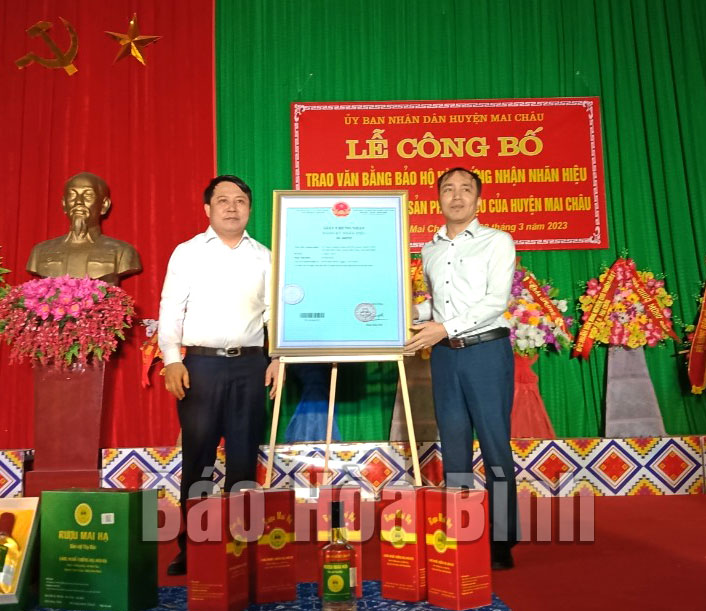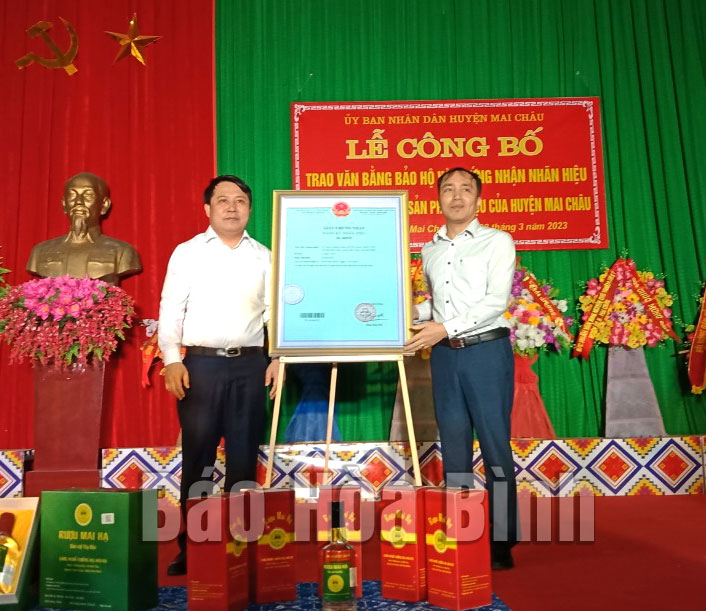
(HBO) – A ceremony was held at Mai Ha commune of Mai Chau district on March 28 to announce and hand over the trademark protection certificate to "Mai Ha wine” product of the district.
A leader of the Mai Chau district People’s Committee hands over Mai Ha wine trademark protection certificate to a representative of the People’s Committee of Mai Ha commune.
Mai Ha wine is exclusively produced in Mai Ha commune. The most special feature of Mai Ha wine is that the yeast is made by locals’ own method with many stages. Many kinds of precious ingredients and herbs are produced locally following the secrets of families passed on to their descendants to create a unique flavour that is not found in any wine made in other places.
Mai Ha wine product has been granted intellectual property protection certificate by the National Office of Intellectual Property.
The People’s Committee of Mai Chau has built a set of criteria for identifying distinctive quality of the product, along with trademark design, a set of regulations on management and development of Mai Ha wine trademark, and plans and strategies to promote and sell the product through distribution channels with identification and traceability system, in order to establish a mechanism to protect, manage and use the "Mai Ha wine” trademark, thus ensuring the quality control and trade promotion for the product.
Statistics showed that currently, 45 local households in Mai Ha engage in wine production, mostly in Chieng craft village where 30 producers are residing. Each month, the households produce nearly 2,000 litres of wine to sell in Hanoi and some neighbouring provinces. Notably, Mai Ha wine produced by some facilities has been recognised as a three-star OCOP (One Commune-One Produce) product.
At the ceremony, a representative from the Mai Chau People’s Committee handed over the Mai Ha wine trademark protection certificate to the People’s Committee of Mai Ha commune, and the trademark certificates to 30 wine production facilities in Chieng Ha village./.
According to data from the Hoa Binh Provincial Party Committee, the industrial production index for the first six months of 2025 is estimated to have increased by 20% compared to the same period last year. This marks the highest year-on-year growth rate for this period since 2020.
In the first six months of 2025, Hoa Binh province’s export turnover was estimated at 1.145 billion USD, marking an 18.11% increase compared to the same period in 2024. Import turnover was estimated at $ 804 million, a 17.15% increase, which helped the province maintain a positive trade balance.
The lives of the ethnic minority farmers in Tan Lac district have gradually improved thanks to the new directions in agricultural production. This is a testament to the collective strength fostered through the professional associations and groups implemented by various levels of the district’s Farmers’ Union.
With the motto the "product quality comes first,” after nearly one year of establishment and operation, Muong village’s Clean Food Agricultural and Commercial Cooperative, located in Cau Hamlet, Hung Son Commune (Kim Boi district), has launched reputable, high-quality agricultural products to the market that are well-received by consumers. The products such as Muong village’s pork sausage, salt-cured chicken, and salt-cured pork hocks have gradually carved out a place in the market and they are on the path to obtaining the OCOP certification.
In the past, the phrase "bumper harvest, rock-bottom prices" was a familiar refrain for Vietnamese farmers engaged in fragmented, small-scale agriculture. But today, a new spirit is emerging across rural areas of Hoa Binh province - one of collaboration, organisation, and collective economic models that provide a stable foundation for production.
Maintaining growing area codes and packing facility codes in accordance with regulations is a mandatory requirement for agricultural products to be eligible for export. Recently, the Department of Agriculture and Environment of Hoa Binh province has intensified technical supervision of designated farming areas and packing facilities to safeguard the "green passport" that enables its products to access international markets.



